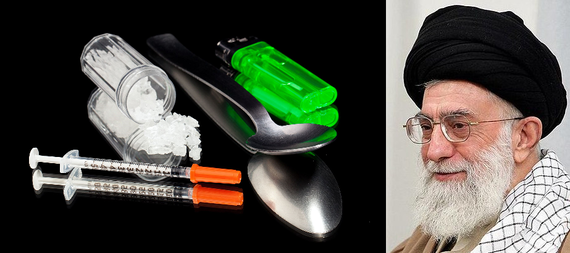The Iranian government seized its first set of production facilities right around the time that AMC aired its very first episode of Breaking Bad, a show about a struggling chemistry teacher who uses his scientific know-how to create the purest methamphetamine ever made and slowly rises to the head of a meth distribution syndicate. In Iran, discretionary use of heroine was at its peek before sheesheh (Farsi for "glass") made its way into the scene in 2008. Use quickly spread like wildfire, from housewives wanting to shed a few pounds (meth suppresses appetite), to students with an upcoming final (short term effects increase concentration), to underground party-goers seeking a good high.
The suppliers found it less risky to produce and distribute. With sheesheh, unlike plant based drugs (like cocaine and heroine), there are no crops to grow, and no Afghani smugglers to deal with. Crystal meth is synthetic. A meth lab can be anywhere. All one needs is a room and a few supplies. Thus production facilities are cheaply made, easily controlled and, more importantly, easily abandoned.
By 2010, Iranian meth manufacturing operations expanded to Japan, Malaysia and Thailand. By 2012, Iran was the world's fourth highest importer of pseudoephedrine (the main ingredient in the production of crystal meth). Now, over a half a million Tehranis between the ages of 15 and 45 have reported using sheesheh at least once.
When it comes to the Iranian drug scene, the problem is not just how widespread it is, but also the limitations of available protections. "The younger generation is more involved in underground parties and usage of drugs," say "Termeh" and "Giti," who asked their real names be withheld from this piece. This Iranian daughter and mother who live in the United States but spend a great deal of time in Iran spoke anecdotally about the Iran drug scene. Termeh explained that when things go wrong at parties, for example, "if a young girl is raped while high at a party," even if she is severely injured from her assault, there is little recourse. "She'd have to admit to being at the party, and being high." The penalties for such infractions are so severe that she, or her family, are likely to keep everything discrete.
Termeh expressed concern not just with the usage of crystal meth, but heroine, opium ("everyone smokes opium"), steroids, and even the illegal alcohol. "If they don't buy (alcohol) they make their own alcohol which is not safe because if you don't use the right chemistry you can end up with a failed liver or go blind. There are so many medical risks." Termeh's mother, Giti, chimed in with grave concerns about the youth in Iran. "It's fine for the first six months (of meth and steroid use), but then they behave like animals."
Termeh and Gita, however, were clear that this problem is not hidden. "The doctors are warning every about it, and its in the magazines!" said Gita.
Indeed, despite the minimal protections for victims of drug use and the Islamic Republic's typical manner of glossing over their domestic problems, Iran spends approximately one billion dollars per year on anti-drug operations. Since 1979, Iran's war against drugs has cost more than mere dollars - almost 4,000 Iranian law enforcement personnel have been killed in the country's battle against the drug trade. And of course, punishments of prosecuted manufacturers and distributors are severe. According to the Iranian interior minister, Abdolreza Rahmani Fazli, nearly 80% of prosecuted traffickers are given the death penalty.
Given the rise of drug use, however, these measures are clearly not very effective. In fact, the same severe and repressive regime killing drug dealers with impunity is the very same one from which drug users want to escape, even if through a temporary high.
By Shermin KruseAuthor of Butterfly Stitching
Many thanks for your "likes", "shares," "tweets", and thoughtful commentary. Dynamic and respectful conversation is welcomed and appreciated. Yours, Shermin

